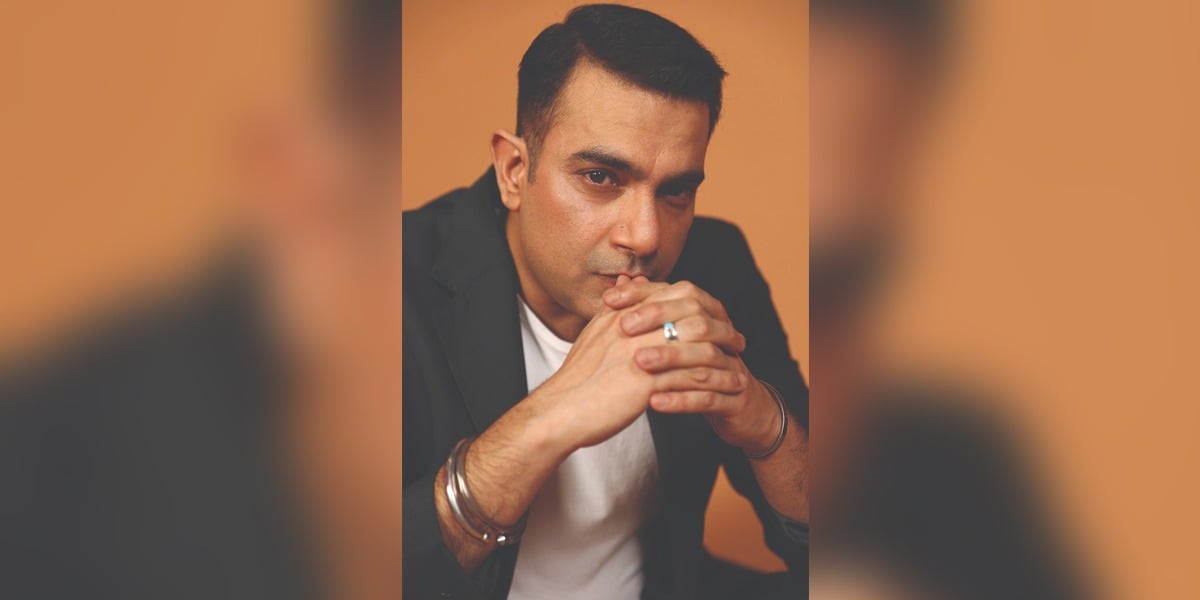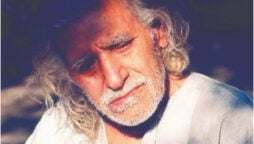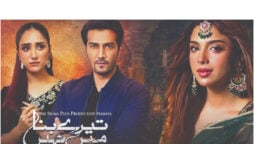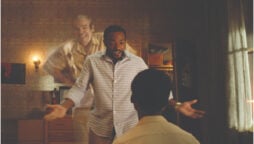
Kamli is based on a short film that was a thesis project of a student from NCA, Meher Bano. I bought the rights to it and it became the seed for the whole big tree Kamli is now. I don’t feel comfortable when one feels forced to give labels and descriptions to their work. I would much rather they aren’t there, but for all intents and purposes, it is a women-centric story as one can tell from the teaser trailers
It is of utmost pride for any country to produce individuals as talented, accomplished, and capable as Sarmad Khoosat, an actor, a director, producer, and screenwriter. Having been recognised throughout his impressive career as someone who is not afraid to take risks, his works have always been daring and impactful. From directing popular dramas such as Humsafar and Shehr-e-Zaat to flawlessly portraying Saadat Hasan Manto in his film Manto, to his film Zindagi Tamasha being selected as Pakistan’s entry for Best International Feature Film at the 93rd Academy Awards, Sarmad Khoosat is no less than a national treasure.
Continuing to build upon his legacy as one of South Asia’s finest filmmakers, Sarmad has finally released the much anticipated ‘Kamli’ on June 3, 2022, across theaters in Pakistan. Directed by Sarmad, the movie is being released under the banner of Khoosat Films, which just celebrated a massive win at the Cannes for Saim Sadiq’s ‘Joyland’, winning the Jury Prize in the Un Certain Regard category.

This exclusive interview with Sarmad unveils his strategy of bringing magic to the screen and also covers everything one needs to know about his recent movie Kamli, collaborations involved in its making, the process of filmmaking itself, and the challenges faced, and subsequent healing in the face of adversity.
The win
BOLD: First of all congratulations on ‘Joyland’ winning the Jury Prize Un Certain Regard at the Cannes Film Festival and receiving a standing ovation. How do you feel and what does this international recognition mean to you?
SK: It’s unbelievable whatever has happened at Cannes. It all feels like a dream. It is a dream many of us have dreamt of and one which came true. Kudos to Saim Sadiq, the main creative force behind Joyland. Winning this award puts us as Pakistanis on several maps because we are recognized as people who can make cinema as opposed to the fact that a large part of the world doesn’t even know we are making films, or that we can make good cinema. Secondly, I feel we are always complaining about horizons and opportunities primarily on the distribution front for our films, and we have a small market which is only say, at home. So if films have to become bigger and in terms of scale, big enough as the rest of the world, then we need a larger audience. The Cannes platform and being recognized at Cannes gives us, filmmakers, an opportunity and a hope that we will have a bigger window for our films.
The birth of ‘Kamli’
BOLD: ‘Kamli’ is the second film being released under Khoosat Films. How did the writing of the script for this film come about and why did you feel it was a film you wanted to direct?
SK: I would say Kamli is a story that found me. When you are telling stories through a long narrative like a feature film, then of course it’s never about ‘an’ idea or ‘a’ something. There are so many aspects fed into it. Of course, as it grew with time, numerous personal experiences, memories, etc. were poured into it. I collaborated with this exceptional young writer called Fatimah Sittar, who is an NCA graduate, and I wrote Kamli with her. It’s based on a short film that was a thesis project of yet another student from NCA, Meher Bano. I bought the rights to it and it became the seed for the whole big tree Kamli is now. I don’t feel comfortable when one feels forced to give labels and descriptions to their work. I would much rather they aren’t there, but for all intents and purposes, it is a women-centric story as one can tell from the teaser trailers. For the lack of a better word, it is also a romance and as people like to call films about love, love stories, so Kamli is a love story. It has mystery and drama. It is about human love, loss, and secrets humans have and keep. I am sure many people will be able to connect with some part of it.
BOLD: What was the process of casting for the film as a director and how has your experience been working with this particular cast?
SK: The process or the alchemy of casting is also a mystery to me. When does that Aha! moment happen? When does the transition take place from it being a character on a page to becoming a human representation? When does one find surety that this is the person? I have never been able to figure it out, to be honest. It’s always a vibe and a feel for me. With the casting of Kamli, all these actors are stalwarts, they are seasoned, established superstars, and I have worked with most of them already. Considering the range that was required, and the nature of the characters, some names just came to my mind instantly. These are people whom I am a fan of, namely Saba Qamar, Sania Saeed, Nimra Bucha, and Omair Rana. The new boy, Hamza Khawaja, has been described in our log lines as a mysterious wanderer. So that element of mystery to him was important to me, and I thought it would be nice to cast a new actor. As a part of the storytelling technique, I want viewers to explore him. Such an ensemble makes things interesting when you put seasoned actors with people with lesser experience or complete newcomers. We had a very elaborate series of auditions, open calls for auditions, and we auditioned a whole bunch of boys for the role. Eventually, Hamza was selected. He is a LUMS graduate and a fitness trainer by profession. Kamli is his debut film.
BOLD: Was it a conscious choice to work with the very talented Saba Qamar again? What made you think that she would do justice to the lead role of Hina?
SK: Saba is one of her kind. She does not just have an exceptionally rare talent and range when it comes to acting, but her dedication and her professionalism are so inspiring that every time we have worked together, it has been a truly inspiring experience. We’ve been working together for more than a decade now. I think we have done at least five projects together. So with Saba, just that confidence that we have, that trust, and the range she has – I can push things a little- is what made me choose her for this role. Hina is a very complex character to play with multiple layers to her. I feel Saba has the emotional capacity and experiential knowledge of so many things that she gives you the truth on camera. Besides being a colleague and director, I am also a huge fan of hers. So if anyone ever asks me, ‘Why Saba Qamar?’ I say, ‘Why not Saba Qamar’?

BOLD: ‘Kamli’ is described as a tale of love, loss, and cloaked secrets. Do you think this movie will be of interest to the masses?
SK: Regarding this preconceived notion about what is liked by the masses and what is not, I feel many a time, we have been proved wrong on that front in terms of how commercial films should be made, or just the terms commercial and non-commercial in themselves. I find it a little fuzzy now. Many films with all the ingredients (what we think would attract the audiences), don’t do well, and films that are not so formula-driven or compliant with the mainstream sensibility, do wonders. I feel all the ingredients people associate with a ‘massy’ cinema or cinema that would appeal to a larger audience are there, but as an artist, I want to exercise and retain my right to use those ingredients my way. So elements-wise, there are songs, there is a girl and a boy, there is drama, there are beautiful locations, and these are the ingredients that make for a sub continental, commercial film. But the way these elements have been used, I feel they are not coming with too much of a conscious burden of ‘Oh, we need to make it different.’ I’m only being true to my style and to the way the entire team wanted to sketch the story. So if it looks different from the other mainstream stuff, it’s only because we are just doing it our way. Good or bad is what people will decide. We have just exercised that independence.
BOLD: As a Director, what kind of visuals and cinematography have you used in ‘Kamli’? The trailer shows some beautiful locations, where did you shoot the film?
SK: Kamli is visual-heavy; its filming location and the backdrop are key elements, other than the human characters. The terrain of Kallar Kahar, Soon Valley, Neela Wahn, and the entire area of Khushab is where we shot the movie. What I know of the history of the area is magical, and legendary; there is mysticism and history embedded in its soil. Besides, visually when you look at the area, it has brown mountains with very dark green shrubbery and forests that have sudden lakes. So there are dry mountains and then you see these lakes with green and blue water. The magic of this location has a melancholic beauty about it. It’s not a favorite with tourists, and it’s a tough terrain, so it has not been explored too much either. The emptiness and the vastness of the area are principal characters in the film. The location just lent itself so beautifully to cinematography; all we had to do was absorb the energy of the location. It was tough to mark those locations. We spent months and months selecting and marking spots and doing location recces. Then the shooting phase was quite tough for everyone, both the cast and crew. We were on an adventure.
BOLD: What challenges have you faced while making and directing this film?
SK: Challenges-wise as mentioned the film was all shot outdoors. We shot it entirely on location. This is not a studio-based film. The required physical labour, intense planning, and the logistics involved were very tough. In terms of directing the film, I would say it’s a story that needed a lot of sensitivity on behalf of the whole crew. It’s a story where you are talking about human vulnerabilities, and human emotions, which we usually do not address. Bringing everybody on the same page, maintaining the energy, and the kind of decorum in terms of telling a story that requires silence around the set, for example, was imperative. Everyone had to ensure a quiet dedication. I won’t say it was the most difficult part, but it was different from making other films. All of us had to go into an emotional space.
BOLD: Tell us about the OST for ‘Kamli’ which features six melodious tracks. What was the process of creating the music for the film, and did you work closely with Music Producer Saad Sultan for this?
SK: Music is very important to our sub-continent style of storytelling in cinema. I’m a fan of that genre. Kamli is not a song and dance film; however, music and poetry are essential tools to take your story forward. Saad Sultan has been magical. Working on the OST with him has given me knowledge and education on music, and I got to collaborate with such wonderful and legendary people, such as Zulfiqar Ali sahab. He is the music composer for Choorian and many other films. He composed two songs for Kamli (Mukhra and Aag). Saad has composed two songs (Kaash and Paani), and one song, Naina, is composed by Sohail Shehzad, a brilliant singer who wrote its lyrics as well. Izzat Majeed sahab of Sachal Studios had recordings of Reshma jee’s raw, unfiltered vocals. We bought rights to those. And then Saad was the main lead who produced music for all these tracks. I want people to listen to the soundtracks. I love the music of my film. I feel this music has a connection with me because each song took a long time from its inception to its final production. In the screenplay, every song has a significant spot and a specific need; hence they will not detour from the story. These songs have been written like scenes and dialogues have been incorporated into the flow of the narrative.
BOLD: What are some of the memories you will cherish most about making this film with your entire team (cast and crew)?
SK: I have not just worked with a stellar cast; my crew comprised bright, young, talented, new filmmakers. We worked with many new faces – from writers to those recording sound; from my DOP, Awais Gauhar, a fresh DOP for a feature film, to my sister Kanwal Khoosat who produced the film; from a lot of other young actors to some new singers. Even my direction team had some new faces who are not as jaded as I am (laughs); they do not have the burden of practice and over practice. A person who has been around for a long time sometimes feels they lack freshness, rawness, that beautiful rough-around-the-edges type quality to one’s work, and it becomes stale. This is what I enjoyed and is, what I feel, a major achievement of Kamli – all of us came together with our strengths, faults, and flaws, and we managed to tell the story together. Working with my team, I feel has been such a wonderful experience; the bonds we made, the friendships we formed, and the spirit of camaraderie we had are memories I will cherish always. We lived together for many months at a far-off location, away from home; we created this new family. My Kamli family consists of beautiful memories.
BOLD: Are you nervous about the release and feedback of the film, and how do you personally deal with criticism, be it constructive or otherwise?
SK: I guess everybody is nervous about a film release. I’m always nervous because it’s a declaration that now I have abandoned it, I cannot touch it, I cannot change things about it, as it has been handed over to the audience. I think separation anxiety and nervousness about how people will receive the film are always there. Regarding criticism, movies are for people to watch. All artistic expressions, particularly cinema, with many other art forms, are made for an audience. You want people to watch them, you want people to feel and to take something from them. If they have to say something negative as a consequence of a feeling the film leaves them with or as a result of having been made to think about the subject matter, then criticism is alright – as long as the film engaged them. Achieving some level of engagement is what any filmmaker strives for. I am very open to criticism, honestly. I do not want to be obsessed with my work. I do not want to over-explain my work either. For me, when a film is released, it is done, and whatever flaws are there, are there. I don’t want to defend my film. This is how I did it, and it’s for you the audience to now take it from me and see what it makes you feel. Yes, criticism is crucial.

The wounds and the healing
BOLD: How does it feel to face resistance from within your own country regarding Zindagi Tamasha, whereas you are simultaneously receiving international acclaim for your work? What is the update on the release of Zindagi Tamasha in Pakistan?
SK: The scar of Zindagi Tamasha has become a beautiful mark (laughs). I want to keep it. It’s just there and it’s a very precious scar. Regarding the release, I was set to release it in March this year but my distributors thought it was not a good time strategy-wise, hence the delay. We aim for a theatrical release in Pakistan, during the remainder of this year.
BOLD: In the last few years, how have you dealt with the constant threats you faced, and how has that mentally/ emotionally affected you as a person and as a Filmmaker?
SK: I don’t think anybody likes to be threatened, and neither are threats welcomed. A famous quote is, ‘Whatever doesn’t break you, makes you’, and its recent example is when the world was hit with a massive catastrophe of the Corona pandemic. It was devastating, but somehow, quarantine and lockdowns gave us all time to heal from so many things. The pandemic timed so oddly with the Zindagi Tamasha goings-on. The lockdown helped me heal. I initially went through a phase where I started doubting myself. I wondered if I had gone wrong somewhere, or perhaps I made something sensational that has created all this noise. Self-doubt was very disturbing for me. I was second-guessing my choices and ideas. I went through this phase for a while. But then I thought, ‘No, this is just plain unfair!’ I processed it, I grieved it, which took time, but it helped. Films take years and they take your soul, heart, and on some occasions, literally your blood too. It affects you emotionally. Zindagi Tamasha is a story, which is very personal because it’s set in Lahore and is associated with so many memories of my beloved city. The characters are borrowed from people I have seen, lived with, and loved. Organically, a lot of personal stuff has gone into the film. When something so precious gets threatened, it affects you emotionally and profoundly.
Up Next?
BOLD: What future releases can we expect from Khoosat Films and are you going to direct a movie or act in it?
SK: From Khoosat Films, this year we have Kamli. Hopefully following that, we will release Zindagi Tamasha at some point. We will now bring into Pakistan our co-production, Joyland, which had its world premiere just recently. It is currently in the planning phase. Other than that, right now I feel quite drained emotionally and artistically. So in between or post these releases, I would like to rejuvenate a little, replenish my rather dry mind and then, I will think of what to do next. Of course, this is what I do as a profession, I love stories, I love telling them and I do feel there are stories I have somewhere in my heart and my mind that I need to tell. But first, a little break!
Catch all the Breaking News Event and Latest News Updates on The BOL News
Download The BOL News App to get the Daily News Update & Live News.












 Read the complete story text.
Read the complete story text. Listen to audio of the story.
Listen to audio of the story.